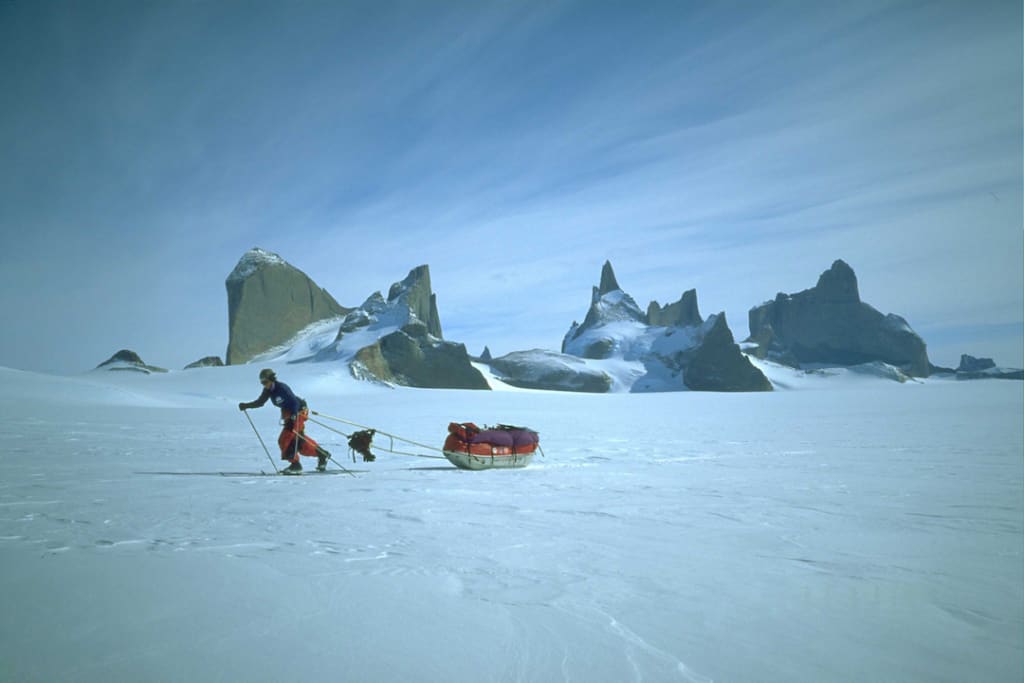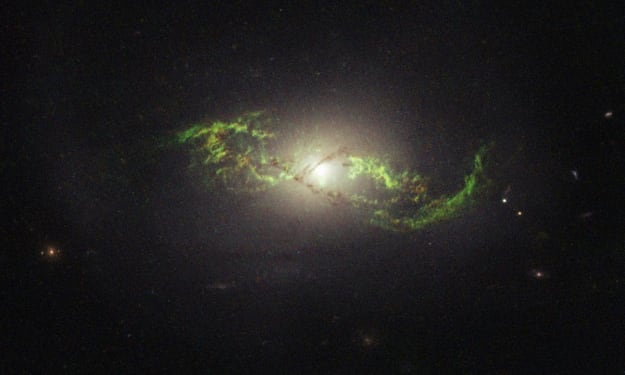Achieving Greatness
“Growing up in a rural setting in Minnesota, I was raised with the outdoors and a sense of adventure.”

May 1, 1986
Sitting in a tent, swaddled in a blanket, Ann stared out over a white wasteland of ice. The wind whipped across a monochrome landscape, where signs of humanity were few, fragile and temporary. She was cold, but she had been cold much of her life, and it invigorated her. It cleansed her soul and stripped her psyche of the detritus of daily life. It sharpened her focus and fired her ambition.
She was bone-tired and exhilarated. For 56 days, she had been alone with five other people, a few sleds, and a team of dogs. In eight weeks, they had traveled over 700 miles as the crow flies. Only no crows were flying, as they were on the top of the world - literally - newly arrived at the North Pole. And no matter which direction she faced, she was looking south.
January 18, 1966.
The kids played hard in Ely, Minnesota. And no one played harder than Ann. Even at ten, she was a natural leader, who organized expeditions that ranged across miles of territory - way farther than even her parents, who encouraged her free spirit, imagined their headstrong daughter would travel. Living on the edge of the million-acre Boundary Waters Canoe Area Wilderness, your horizons are distant. And the wanderlust of an active child gobbles up distance and spits it out with disdain.
One mid-winter Saturday, a pack of local kids, pulling sleds like they were Arctic explorers, tramped through the forest. They looked for animal tracks, scat, and evidence that the hardy animals living on the border with Canada were foraging for food hidden by snow. The winter had been uncommonly warm. On some days, the temperature had even risen above freezing. That day, with the thermometer reading 22ºf, the air still, and the winter sun shining in an unclouded sky, it was time to unbutton snow jackets and stow your gloves in your pockets. Finally, they reached their destination, the northern end of Burntside Lake.
Here they marked out a rink for shinny or pond hockey as the uniformed called it. They had packed their sleds with all the gear they needed for a game. The squat goals Sven’s dad had made out of black cherry wood scraps. Skates. Store-bought hockey sticks, a luxury the old-timers sneered at. And a bucket of beaten-up old pucks that Nathaniel's older brother had scored from Minnesota State U in Duluth. You never knew how many you would need. On a good day, just the one. But after new snow, you could see three or four errant shots disappear into the whiteness. God only knew how many pucks now lay on the lake bottom after a century of thawing ice had deposited these wayward discs hither and yon.
The kids put on extra-thick, long socks that they stuffed with newspaper to protect their shins and laced up their skates. No one was trying to hurt anyone, but in the heat of the moment, stuff happened. Ann played because everyone played. Minnesota is home to American liberalism. And that may well have been fostered by this egalitarian spirit exhibited on frozen ponds. That is not to say there were not some delicate flowers in town - girls who preferred the warmth of the playroom and the company of dolls. But they were usually the offspring of the upper crust and had their hearts set on distant matrimonial prizes.
But all the stuffed socks in the world could not protect Hendy when Charlie lost his footing. As he whirly-gigged to the ice, he slashed Hendy’s throat with his stick. Hendy grabbed the wound with both hands and pressed a palm across the gash on his neck. Blood seeped between his fingers as he lost consciousness and collapsed.
Freddy, a big kid and Ann’s only competitor for the alpha role, stood ashen and immobile. Paul, his sycophantic side-kick, threw up. Other kids were on the verge of tears and looked around helplessly. Ann took charge. Leadership is an unpredictable quality best revealed in times of crisis. The leader can not wallow in doubt or defer to committee opinions. They know what needs doing, and they can seduce everyone else to do it. Ann knew that Hendy needed medical attention.
Not that Hendy knew it. He had woken from his faint, raised himself to a kneel, and was leaning forward in a vain attempt to keep the blood off his clothes. Wan-faced and in shock, he insisted he was OK, and people should just give him a minute. Some of the kids were relieved at his brave words.
Not Ann. She told Freddy to get the longest sled, Walter’s new Gladding Champion Fastback. A gift from his parents for finishing first in fourth grade. It was Walter’s pride and joy. And the astute observer would have noticed the look of apprehension in his eyes as he contemplated what Hendy’s blood might stain. But he swallowed his concerns, as the weight of Ann’s authority rendered protests at her arrangements pointless.
Ann demanded if any of the band had pieces of cloth to make bandages. Little Alice said she had her Raggedy Ann doll in her backpack, and perhaps they could use her dress. Even better, thought Ann, they could use the entire thing. And having decided that, she pressed the floppy doll against the wound and held it in place by winding a scarf as tightly as she dared around Hendy’s neck.
The sun lowered behind the clouds that signaled a fast-moving storm coming from the west. A few light breezes forewarned of stronger winds. And what little warmth there was bled away into the dimming sky. They got Hendy as comfortable on the sled as they could. He lay supine, staring directly upwards, completely expressionless, unmoved by the ministrations of the kids. Ann knew this was probably not a good thing.
The wind picked up. It was blowing directly from the west. The most direct route back to Ely was to the southeast. Had they taken it, they would have returned the same way they came. But on the way there, they did not have a husky youth laying deadweight in a sled. And the direct route ran through the forest. Ann judged it would be impossible to navigate a Hendy-laden sled over protruding tree roots and fallen branches while traveling up and down the rolling, rocky forest floor.
She led them to the southwest along an arm of Burntside lake. The ice made pulling the sled easy, but the featureless expanse exposed them. The wind tugged at their clothes. The exertions of the kids, who took turns pulling the weighted sled, stoked their internal furnaces. But Hendy, lying motionless, was losing heat, and they had nothing with which to cover him.
Ann shifted the group to the west to gain cover from the tree line - which added even more distance to their trek. They hugged the shore, staying as protected as they could by the trees that grew close together down to the lake’s edge. They maintained a steady pace in the dim afternoon murk as rolling gray clouds blotted out the sun. Ann’s determination strengthened the resolve of the other kids even as the snow-thunder rumbled closer and rare winter lightning flashed in the sky.
After an hour, they had traversed the three-mile length of the spur to reach the main body of the lake. Here Ann had the party turn 90º left to the southeast, pointing them directly to town. Making the turn to head home was a relief. But the happiness they felt was tempered by an increase in the wind’s speed and the fact that they could no longer shelter in the lee of the lakeshore trees.
They slogged on for another 30 minutes until they reached the Burntside Lodge, exhausted. A popular destination during the balmy days of summer in Minnesota’s North Woods, it was boarded up in the dead of winter. Ann had Freddy use his Swiss Army knife to unscrew a runner from one of the sleds and use it as a pry-bar to lever away the wood covering one of the windows.
They broke the glass with a stone and reached in, unlocked the window, and raised it. Once inside Ann silently debated if they should grab a few blankets, wrap Hendy up, and try to make the last two miles to town. Or if an unburdened party, traveling light, would get help to Hendy quicker. She decided on the latter.
Freddy and Paul, who had long recovered from his nausea, maneuvered Hendy through the window and onto a sofa in the Lodge’s reception room. Gwen and her brother Knute found the linen store, grabbed blankets, and covered the unresponsive but still breathing boy. He lay limp on the plush pillows of the overstuffed furniture. Ann checked to make sure the makeshift bandage was still in place. Satisfied it was and gratified it was not bloodsoaked, she instructed everyone to leave it be. She did not want to risk a new and uncontrollable bleed by disturbing it.
Ann told Freddy to start a fire with the logs stacked by the massive stone hearth typical of houses and inns in the rural north. Satisfied she had done all she could, she asked Paul if he could come with her. The commanding tone in her voice made clear it was not a request. She would have gone alone, but only fools go into bad weather by themselves.
They set off. The wind whipped up into a gale, but it was at their back and pushed them on. Ann was agile and light on her feet, but Paul tripped several times, cursing with words his uncle had taught him. The temperature dropped. But they were both fit and used to the extreme conditions of a northern Minnesota winter. In 40 minutes, they reached the town limit. Ahead lay the brightly lit Nordstrum home, standing out in the now almost complete darkness. Ann rang the bell and the always jovial Mr. Nordstrum opened the door. But his smile collapsed when he saw the concern in Ann’s tired eyes. She told her story. And a phone call dispatched the town’s emergency services to the Burntside Lodge.
After a transfusion and an emergency surgery to repair the scraped artery - all agreed it was lucky the blade had not traveled another millimeter in - Hendy was placed on the likely to survive list. And survive, he did.
Postscript.
Ann Bancroft continued to live in Ely - apart from the two years she spent in Kenya as a teenager. Despite severe dyslexia, she graduated high school and enrolled at the University of Oregon, where she received a Physical Education Degree in 1981. After college, she returned to Ely as a wilderness instructor.
On May 1, 1986, Bancroft became the first woman to reach the North Pole on foot and by sled. In the Antarctic summer of 1992/93, she led a four-women team on skis to the South Pole, becoming the first all-female expedition to achieve the feat. And in 2001, Bancroft and the Norwegian, Liv Arnesen, became the first women to ski across the Antarctic - a journey of 1,700 miles.
She founded the Ann Bancroft Foundation. Its mission is, “to inspire and encourage girls to imagine something bigger”. And with Arnesen, she co-owns Bancroft Arnesen Explore, which promotes the spirit of adventure in both the disabled and able-bodied.
Note.
While Ann Bancroft’s achievements are true, the story of Hendy’s rescue is complete fiction - as far as I know.





Comments
There are no comments for this story
Be the first to respond and start the conversation.